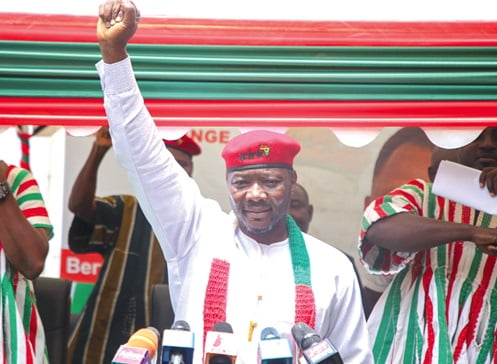Bernard Mornah, the flagbearer of the People’s National Convention (PNC), has expressed his intention to appeal to the Supreme Court following a High Court ruling that dismissed his lawsuit challenging the Electoral Commission’s (EC) decision to disqualify him from the upcoming 2024 presidential election. Mornah’s disqualification, along with that of ten other candidates, has raised significant concerns about the integrity of the electoral process, leading him to assert that the EC made errors in their judgment. In a press interaction on October 21, he conveyed his belief in the legitimacy of his claims and his determination to seek an appellate court’s review.
Mornah’s situation underscores a broader debate about the rules governing candidate eligibility in Ghana’s elections. He contends that the EC’s disqualifying decision is predicated on mistakes that were not merely administrative but rather reflect deeper systemic issues within the commission. He questioned the rationale behind the errors cited in his disqualification, highlighting a lack of transparency regarding whether these were mere data entry mistakes or more significant misjudgments. By drawing attention to these concerns, Mornah not only defends his own candidacy but also raises fundamental questions about the EC’s protocols in handling electoral candidacy.
Central to Mornah’s argument is the contention that the judge in the original case did not fully consider the nature of the errors purportedly made by the EC. He criticized the ruling for its perceived disregard of substantive issues presented in court. According to Mornah, the judge’s oversight highlights the need for a more thorough judicial examination of the circumstances surrounding the disqualification. His insistence that the case warrants further scrutiny signals his broader commitment to ensuring that all candidates are treated fairly and that the electoral process remains just.
In light of the dismissal, Mornah has directed his legal team to prepare for an appeal to the Supreme Court. He indicated that his lawyers are committed to analyzing the details of the case swiftly so that they can argue effectively for a reevaluation of the initial ruling. This move not only signals his resolve to fight for his right to contest in the elections but also reflects a strategic effort to question and potentially remedy the procedural integrity of the EC. Mornah’s actions may set a precedent for how similar cases are handled in the future.
Mornah’s insistence on ensuring transparency and accountability from electoral authorities resonates among his supporters and the wider populace, who may share similar concerns about the legitimacy of the electoral process. His actions reflect a growing demand for electoral reform and for mechanisms that prevent arbitrary disqualifications that can undermine democracy. The discourse surrounding his disqualification serves to highlight the delicate balance of power between political candidates and the institutions that oversee electoral processes.
Ultimately, Mornah’s case represents more than just a personal battle for candidacy; it is emblematic of widespread concerns regarding the integrity of election administration and the preservation of democratic rights in Ghana. His planned appeal to the Supreme Court is not simply a legal maneuver but a call for a reassessment of electoral practices that affect candidates and voters alike. Whether he succeeds in overturning the High Court’s decision remains to be seen, but his high-profile case will likely keep issues of electoral fairness and justice at the forefront of national discourse as the nation approaches the 2024 presidential elections.














